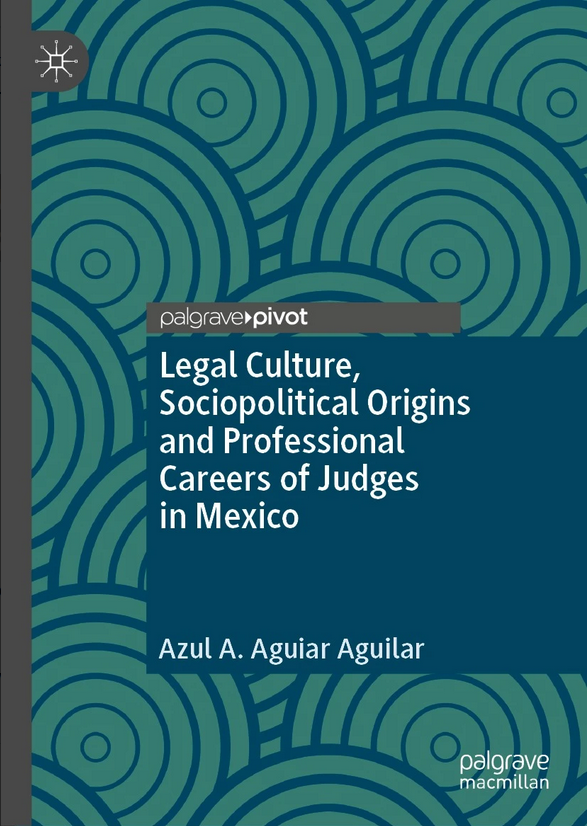Legal Culture, Sociopolitical Origins and Professional Careers of Judges in Mexico
By : Azul A. Aguiar Aguilar
Springer


This book explores the careers, professional trajectories and legal cultures of judges in the federal judiciary in Mexico. So far, there has been limited research on internal factors contributing to the understanding of judicial power dynamics in Mexico and other Latin American countries at large; this Work fills an important gap in the literature through its empirical investigation of internal legal cultures and judicial norms, offering new data, measurement strategies,and insights into the interactions between law, politics, norms, legal culture(s), as well as judicial behavior. Utilising an original survey, the chapters analyse judicial conceptualizations of role norms, legal cultures, proclivities for judicial activism, and judicial behavior. In so doing, this book contributes to understanding of underlying key internal factors of judicial activism or restraint, in turn moving forward the debate that seeks to explain judicial behavior reliant on internal and ideational perspectives. Complementing limited but existing studies of judicial politics in Mexico through its analysis of judges beyond those that sit at the Supreme Court, this book will be of particular interest to Latin-American judicial politics scholars due to its focus on the judicial power from internal perspectives as well as sub-national judges, filling a void in the literature vis-à-vis the study of courts in Latin America. This Work was originally written in Spanish, and the translation was done with the help of artificial intelligence. A subsequent human revision was done primarily in terms of content.
Azul A. Aguiar Aguilar is Professor of political science in the Department of Sociopolitical and Legal Studies at ITESO, the Jesuit University of Guadalajara, Mexico. She holds a PhD in Political Science from the University of Florence, Italy. She teaches courses of political science, judicial politics and theories of democracy in undergraduate and graduate programs at ITESO and the University of Guadalajara. Her research interests include comparative judicial politics and democratization processes. Professor Aguiar has edited books and published several articles in peer-reviewed journals about democracy, courts, and justice-sector institutions. She has been distinguished as a member of the National Researchers System in Mexico. She is also a member of the IPSA Executive Committee and Co-Chair of the 2025 IPSA World Congress of Political Science.
Contents
1 Introduction. Unveiling the Judiciary: An Inside Perspective
Organization of the Book
Bibliography
2 Judicial Politics in Mexico: Understanding the Legal Culture of Judges
Institutional Changes in the Judiciary
Judicial Behavior
The Legal Culture of Judges: A Theoretical and Empirical Measurement Proposal
Conclusions
Bibliography
3 Studying the Judicial Elites: A Methodological Approach
Qualitative and Ethnographic Studies of the Judiciary
The Survey as a Tool to Understand the Judiciary
Conclusion: Studying the Subnational Federal Judges in Mexico
Bibliography
4 Who Inhabits the Federal Judiciary? Sociopolitical Origins and Professional Trajectories of the Judicial Elite
The Study of Judicial Elites
The Sociopolitical Origins of Judges
Educational and Professional Trajectories
Judicial Profiles, Satisfaction, and Professional Prospects
Conclusions
Bibliography
5 The Internal Dynamics of the Judiciary: Recruitment and Judicial Career
Models of Recruitment and Judicial Governance
Pathways to Becoming a Judge in the Federal Judiciary
Paths and Dynamics of the Judicial Career
Conclusions
Bibliography
6 The Legal Culture of the Judicial Elites in Mexico
The Political Role of Judges: Between Legalism and Argumentative Constitutionalism
Types of Legal Culture in the Federal Judiciary
Conclusions
Bibliography
7 Concluding Remarks: The Judiciary—A Privileged, Nepotistic, and Formalistic Institution?
Bibliography
Appendix I
Bibliography
Index











